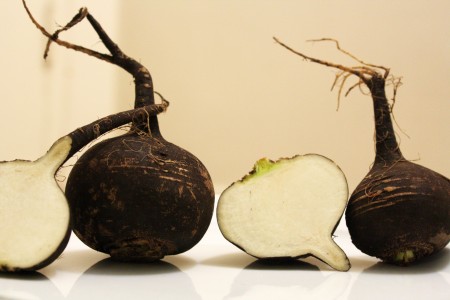Black Radish, the Golden Vegetable of the Antiquity – Therapeutic Recommendations
Among the most valuable root vegetables, radish occupies the first place, followed by beet root and celery. The fathers of history and ancient medicine, such as Herodotus, Hippocrates, Theophrastus and Dioscorides had their own therapeutic recommendations when it came to radish.

Radish has been cultivated as an edible vegetable for over 4.000 years and it’s mentioned by the old Greeks and Romans, in the Middle Ages, during the Renaissance and along the centuries until today, when it’s being researched by numerous scientists for its extraordinary curative properties. Researchers have discovered that the slaves who were working hard on the pyramids received, besides garlic, radish as physical stimulants and tonics.
Recent scientific studies based on the recommendations of ancient popular medicine uncover many more curative qualities attributed to vegetables, once rightfully considered medicine. Black radish presents the most numerous medical properties and it is also known as “winter radish”.
Black radish contains proteins, potassium, calcium, phosphorus, iron, vitamin A, vitamin B1, B2 and B3, vitamin C and volatile sulfur compounds. It has diuretic, liver stimulant, anti-allergic, digestive and expectorant properties.
Therapeutic recommendations
First of all, the black radish is considered one of the most efficient natural remedies for the dissolution of gallstones, due to its anti-lithiasis properties. In recent studies, similar properties were demonstrated by birch leafs and madder root.
The black radish has a cleansing effect upon the bronchi, lungs and respiratory system. Black radish juice helps with the cleansing and regeneration of the mucous membranes in case of sinusitis or rhinitis. It calms coughing, fluidizes the bronchi secretions, encourages digestion, helps eliminate intestinal parasites, prevents the formation of liver and kidney stones and it reduces nervous excitability.
The black radish can also be considered a powerful medicine for the following afflictions:
– Liver problems (jaundice, hepatic failure, cholecystitis)
– Pulmonary diseases (chronic bronchitis, respiratory catarrh, asthma)
– Rhinitis, sinusitis
– Digestive problems (atony, lazy stomach, constipation)
– Insomnia
– Arthritis
Due to its high value of vitamin C, A and B, the black radish can be helpful in case of nutritional deficiencies or scurvy.
Grated radish can also be used externally, in compresses used to treat internal organs in a congestive state (pneumonia, congested liver etc.). The compresses must be placed on top of the affected organ.



